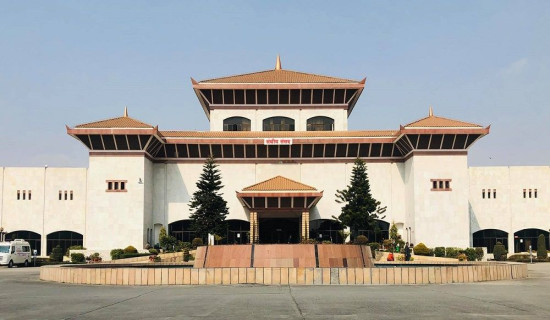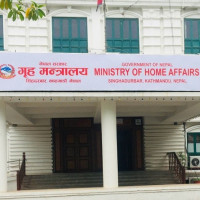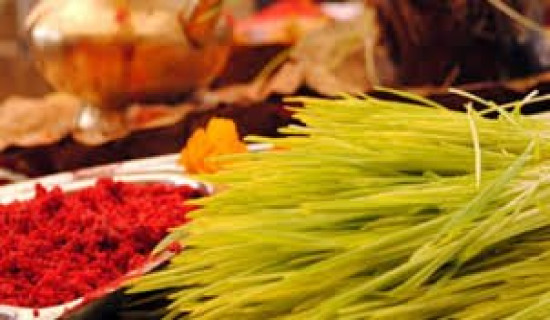- Tuesday, 16 September 2025
Intense internal rift plagues political parties in Nepal
By Pallav Bhusal,Kathmandu, Aug. 10: As Nepal grapples with the challenge of economic recovery and the unfinished business of constitutional reform, the political parties are embroiled in deepening internal rifts.
From the ruling CPN-UML to the Nepali Congress, the CPN-Maoist Centre, and even historically new and small forces like the Rastriya Prajatantra Party (RPP) and Nagarik Unmukti Party, almost all parties are now mired in factionalism, unresolved disputes, and power-centric ambitions.
The announcement made by former President Bidya Devi Bhandari to return to active politics, intended perhaps as a symbolic gesture of ideological realignment, fueled a big dispute in the UML, prompting the party to hold a series of meetings to prevent her from joining the party politics. Her decision to make a comeback in party politics was met with stiff resistance from the party chair and Prime Minister KP Sharma Oli, and other UML leaders, as they took her move as a potential threat to the current UML leadership.
The UML’s central committee ultimately revoked Bhandari’s renewed party membership, arguing that a former head of state re-entering party politics could erode the democratic system. But the party decision was challenged by some senior leaders such as Yubaraj Gyawali, Surendra Pandey, and Karna Bahadur Thapa, as they wrote a formal note of dissent.
Still the former President is reportedly giving continuity to her activities with the aim of returning to party politics by setting up a contact office, and this has divided the UML leaders from the centre to the grassroots level.
“All this inter-party conflict stems from a lack of democratic culture, particularly the failure to accept majority decision. In a true democratic system, leadership is chosen either through majority vote or consensus. However, what we often see is the minority aggressively challenging the leadership, which is not a healthy practice. There must be a culture of respecting leadership that emerges through legitimate processes, but unfortunately, that is sorely lacking in our country,” said Mahesh Raj Dahal, former ambassador to Australia and political expert.
Dahal’s sentiments are echoed across ideological lines. In the Nepali Congress, the struggle between party president Sher Bahadur Deuba and senior leader Dr. Shekhar Koirala has intensified following disciplinary actions against 18 members of the Koirala camp, based on allegations tied to the 2022 elections.
Koirala, seeking to capitalise on dissatisfaction with the Deuba-led alliance government, has not only ramped up his media engagement but also courted figures such as Bhandari and Maoist Centre chair Pushpa Kamal Dahal ‘Prachanda’. These political overtures signal possible realignments, and fresh instability.
“If there were proper conflict resolution mechanisms within political parties, this would not escalate into a crisis,” said Professor Krishna Hachhethu, a noted political scientist at Tribhuvan University. “Conflict is inherent in all political organisations, but Nepali parties do not have internal democratic culture or institutional processes to resolve these disputes. What we see instead is personal vendetta disguised as organisational discipline,” he added.
The Nepali Congress has become a miniature of the wider instability afflicting Nepali politics. Despite public statements reaffirming loyalty to the current coalition, the internal mood is one of skepticisms. Krishna Prasad Sitaula, though aligned with Deuba, has publicly acknowledged the lack of implementation of key agreements with the UML, including constitutional amendments. Meanwhile, the group of seven leaders aligned with Deuba has positioned itself to block Koirala’s ascendancy.
Even the CPN-Maoist Centre, traditionally more ideologically rigid, has not been immune. The confrontation between party chairman Prachanda and deputy general secretary Janardan Sharma has moved from private meetings to public forums.
Sharma’s demand for internal elections, direct democracy within the party, and a move away from the current patronage-based hierarchy has drawn fire from the leadership.
“There is no functional democracy in the Maoist Centre,” said Sharma during a party meeting, accusing the party of surviving on centralism. Prachanda, in response, ridiculed such demands, insisting that the space already given is being misused to weaken the leadership. The spat has paralysed party functioning, while deepening divisions among sister organisations and youth wings.
Political analyst Geja Sharma Wagle views this across-party conflict and tussle as a cumulative failure. “There is a common pattern, whether UML, Nepali Congress, Maoist or Rastriya Prajatantra Party, leadership that only serves itself. There is no plan for succession, no internal democracy, and no willingness to step aside. Everyone wants to remain supreme until forced out. That’s not leadership, that’s insecurity and selfishness,” he said.
The Unified Socialist Party, led by former Prime Minister Madhav Kumar Nepal, faces its own reckoning with conflict with its other leader Jhala Nath Khanal. After the Commission for the Investigation of Abuse of Authority (CIAA) filed a case against Nepal in the Patanjali Yogpeeth land scam, calls for his resignation have grown louder. Party leaders like Ram Kumari Jhankri and Jhalanath Khanal have demanded that Nepal step down on moral grounds, calling for a special general convention to restructure the party’s leadership.
Meanwhile, the Rastriya Prajatantra Party (RPP) appears to be heading towards a formal split. Chairman Rajendra Lingden has been accused of purging senior leaders including Dhawal Shamsher Rana and Mukundashyam Giri while they were unavailable or undergoing treatment. The Lingden faction claims these actions are aimed at orienting the party towards youth, while the dismissed leaders accuse him of vendetta politics and violating party statutes. The dispute has reached the Election Commission, raising fears of yet another fragmented conservative bloc.
The Janata Samajwadi Party (JSP), which split last year, remains entangled in a legal battle in the Supreme Court over the legitimacy of the division. Its inability to stabilise even after a split indicates the wider malaise gripping Nepali political institutions. And the rift in Nagarik Unmukti Party between Resham Chaudhary and Ranjita Shrestha is another political conflict in the making.
All this has wider implications. The general public, already disillusioned by sluggish economic recovery, poor service delivery, and a faltering governance structure, has little hope left in traditional party leadership.
“Democracy isn’t only about elections,” said Prof. Hachhethu. “It’s about accountability, responsiveness, and inclusion. But what we see is that every party is governed like a private club. There is no space for youth, no space for women in real decision-making, and no interest in reform unless the leadership’s survival is at stake,” he added.
Indeed, most parties have centralised power around a single individual or a small coterie. In UML, chairman Oli has systematically dismantled checks on his authority. In the Congress, Deuba's grip continues through carefully orchestrated alliances. In the Maoist Centre, Prachanda has neutralised dissenters over the years. And in parties like RPP and Unified Socialist, leaders refuse to make way even when embroiled in scandals.
“The tendency of political actors to resolve disputes through exclusion rather than dialogue is alarming,” said Wagle. “It erodes the already thin trust the public has in democracy. These conflicts aren’t ideological, they’re purely personal and opportunistic,” he added.
Meanwhile, vital national issues, economic policy, transitional justice, federal implementation, education reform, barely make it to the political agenda. Parliament, too, has become a battleground for blame game rather than legislation.
“The erosion of institutional integrity in parties translates into paralysis in governance,” says Dahal. “If this continues, people will either retreat from politics altogether or look for extreme alternatives. Neither is healthy for a country like Nepal,” he said.
As party conventions approach, UML’s in November 2026 and Nepali Congress’s rescheduled 15th General Convention, questions remain: Will these gatherings offer real reform or simply reinforce old hierarchies? And more importantly, who among the current leadership is willing to give up power for the sake of democratic renewal? For now, the answer seems totally out of sight.




-square-thumb.jpg)


-square-thumb.jpg)








